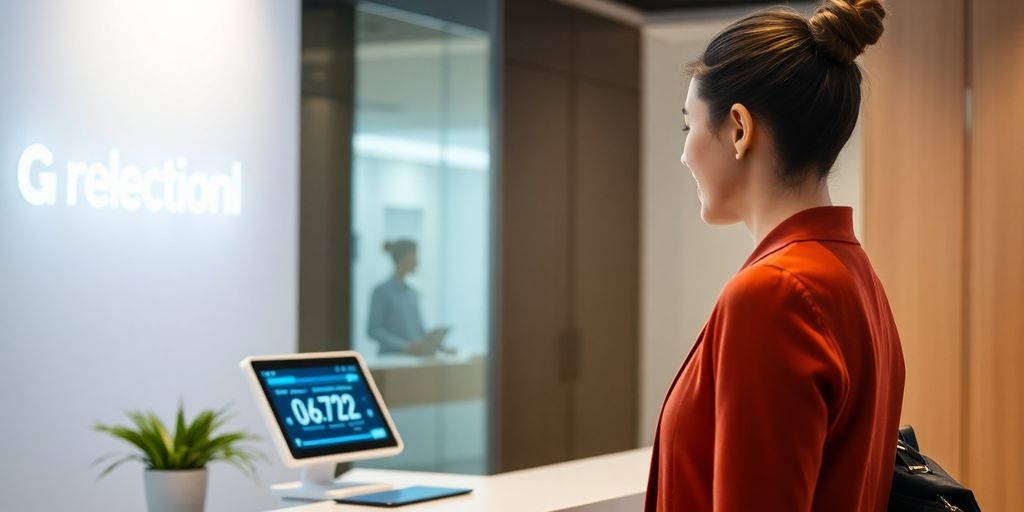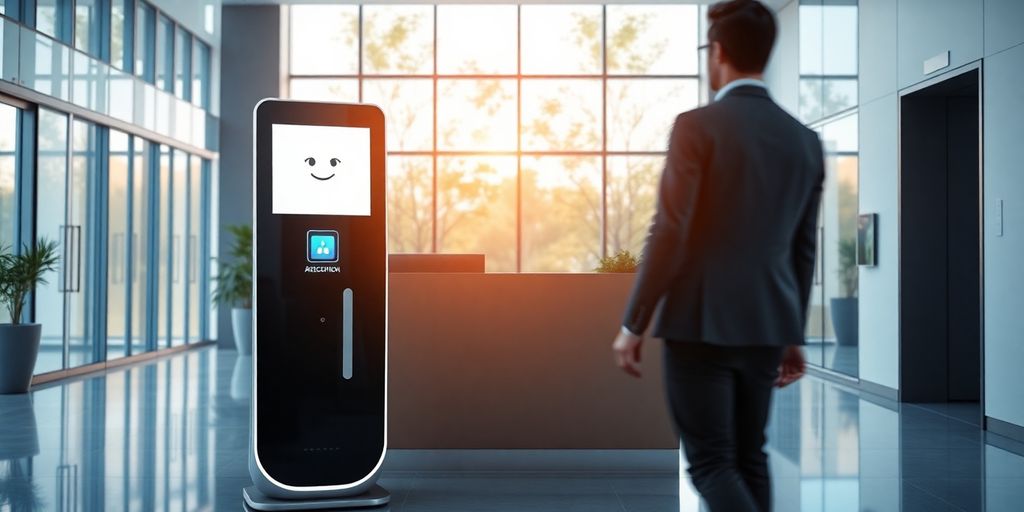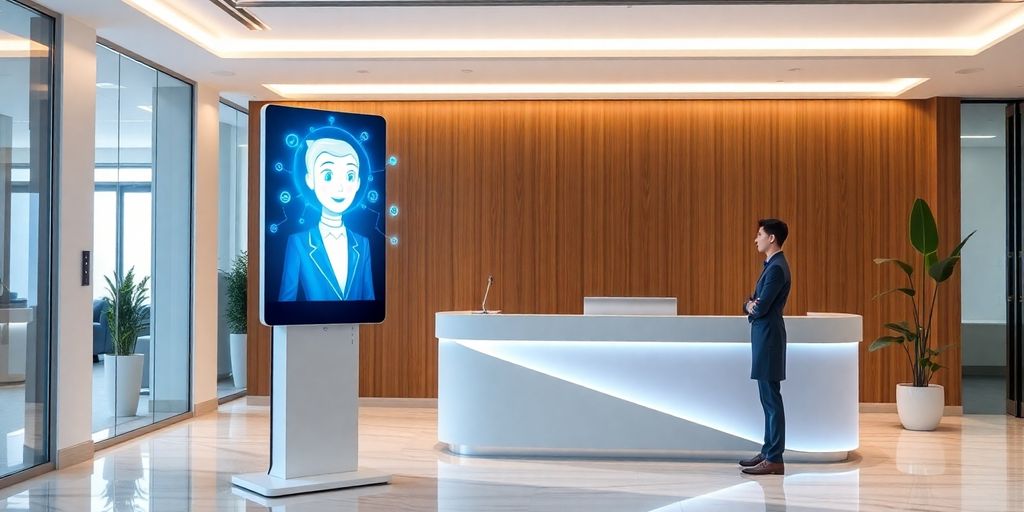It seems like everywhere you look these days, AI is popping up. And in the world of customer service, AI receptionists are really starting to make waves. They're not just answering phones anymore; they're actually changing how businesses connect with people. Think about it – no more waiting on hold, getting consistent answers every time, and actually feeling like the business knows who you are. It's a pretty big deal for making customers happy. So, how do AI receptionists improve customer experience? Let's break it down.

AI receptionists are pretty neat, aren't they? They seem to know just what to say and when to say it. But how do they actually work? It's not magic, it's smart tech. At their core, these systems use a few key technologies to mimic human interaction.
This is the big one. Natural Language Processing, or NLP, is what lets the AI understand what you're saying, whether you're talking or typing. Think of it like teaching a computer to read and understand language the way we do. It breaks down sentences, figures out the main idea, and even tries to catch the feeling behind your words. This means when you ask a question, the AI can actually get what you mean, not just a string of words. It's pretty advanced stuff, allowing for back-and-forth chats that feel more natural.
Then there's Machine Learning. This is how the AI gets smarter over time. It learns from every conversation it has. If it makes a mistake or doesn't quite get something, it learns from that experience. The more data it processes, the better it becomes at recognizing patterns, understanding different ways people ask things, and giving more accurate answers. It's like a student who keeps studying – the more they practice, the better they perform. This means the AI receptionist you interact with today might be even better tomorrow.
What's also really useful is how these AI receptionists can connect with other tools your business already uses. Imagine it calling your calendar to book an appointment or pulling up customer info from your CRM system. This connection means the AI isn't just a standalone gadget; it's part of the whole operation. It can pass information along, schedule things, and generally make the workflow smoother without you having to manually move data around. It makes the whole process much more efficient for everyone involved.
The goal is to make interactions feel as smooth and helpful as talking to a person, but with the speed and availability that only technology can provide. It's about making things easier for both the customer and the business.
AI receptionists can really change how companies talk to people. By looking at customer information, like past service requests or what they seem to like, these AI systems can give answers that feel specific to each person. It makes every chat feel a bit more special, which helps build better connections with customers and makes them happier overall. It’s like having a receptionist who remembers everyone’s name and what they usually need.
One of the best things about AI receptionists is how fast they respond. This means customer questions get answered right away, no waiting around. Quick answers make talking to a company much smoother and more pleasant. Think about it – no more being put on hold or waiting for an email reply. It’s about getting help when you need it, right then and there. This kind of speed really makes a difference in how people feel about a business.
AI receptionists are programmed to give the same correct information every time. This means no more getting different answers from different people. Whether it’s about business hours, product details, or appointment policies, the AI sticks to the facts. This consistency builds trust. Customers know they can rely on the information they receive, which makes their experience much more straightforward. It’s a big step up from the variability that can sometimes happen with human staff, especially when things get busy. We're seeing AI receptionists integrate with existing systems, which helps keep all that information up-to-date and readily available. You can check out some of the ways these systems work at [20c9].

So, why are so many businesses looking at AI receptionists? It really comes down to making things work better and saving money, plain and simple. Think about it: instead of paying multiple people to answer phones, manage appointments, and field basic questions, you can have an AI system do a lot of that work. This frees up your human staff to focus on tasks that really need their attention, like complex problem-solving or building deeper client relationships.
Let's talk numbers. Hiring and training human receptionists is a significant expense. You've got salaries, benefits, office space, and all the overhead that comes with it. AI receptionists, on the other hand, have a much lower operational cost. They work 24/7 without needing breaks, sick days, or overtime pay. For many small to medium-sized businesses, this can mean cutting customer service costs by a substantial amount, sometimes by half or more per call. It's a way to get consistent service without the escalating payroll.
What happens when your business suddenly gets a lot busier? With human staff, you might struggle to keep up, leading to longer wait times and frustrated customers. An AI receptionist can handle a massive number of calls simultaneously. Whether you have ten calls coming in or a hundred, the AI can manage them all without getting overwhelmed. This means your business can grow without worrying about outgrowing its phone support. You don't need to hire more people just to handle a temporary surge in calls; the AI scales automatically. This flexibility is a huge advantage for businesses experiencing rapid growth or seasonal peaks.
When your AI receptionist handles routine tasks like answering frequently asked questions, scheduling appointments, or routing calls, your human team gets a break. They aren't stuck on the phone all day. This allows them to dedicate more time to important client interactions, strategic planning, or other core business functions. Imagine your sales team not having to answer basic product questions, or your support staff not having to book every single follow-up meeting. It means your existing resources are used more effectively, leading to better productivity across the board. It's about working smarter, not just harder.
The ability of AI receptionists to manage repetitive tasks efficiently means that human employees can be redirected towards more complex, engaging, and value-adding activities. This not only boosts individual job satisfaction but also contributes to the overall strategic goals of the company.
It's pretty amazing how AI receptionists are changing the game for customer service. Think about it: no more being put on hold forever. These systems are built to answer questions right away, which really makes a difference in how people feel about a company. It’s like getting instant help whenever you need it.
Remember the last time you were stuck on hold, listening to that awful music? Yeah, nobody likes that. AI receptionists cut out the waiting game entirely. They're programmed to respond immediately to inquiries, whether it's a simple question or a more complex request. This speed means customers get the information they need without delay, leading to a much smoother and more positive interaction. It’s all about giving people what they want, when they want it.
Businesses aren't just open 9 to 5 anymore, and neither are customer needs. AI receptionists work around the clock, every single day of the year. This means a customer in a different time zone, or someone with a late-night question, can still get help. It’s like having a receptionist who never sleeps, always ready to assist. This constant availability builds trust and shows customers that their business is important, no matter the hour.
Beyond just answering questions, AI receptionists are designed to make the whole experience better. They can understand what people are saying, even if it's not phrased perfectly, thanks to natural language processing. They can also pull up customer history to give more personalized answers. When you combine quick responses with helpful, relevant information, it just makes for a much more pleasant conversation. It feels less like dealing with a machine and more like getting efficient, friendly help.

Think about the last time you called a business and were put on hold. It’s pretty annoying, right? AI receptionists are changing that. They can answer questions and handle requests almost instantly, with response times often measured in mere milliseconds. This speed makes interactions feel natural, not like you’re talking to a robot stuck in slow motion. It means customers get the information they need right away, which is a big deal for keeping them happy.
One of the best things about these AI receptionists is that they don't usually require a whole new phone system. Most can connect with the software you're already using, like your customer relationship management (CRM) tools or scheduling apps. This makes things way easier. You can keep your current phone number and everything just links up. It’s like adding a super-efficient new employee without all the usual setup headaches. This kind of integration is key for making sure customer data flows smoothly and no one has to do double the work. It’s a smart way to upgrade your service without disrupting your whole operation. For businesses looking to streamline, this is a major plus, and you can find out more about how these systems work by looking at Novi's capabilities.
When you're dealing with customer information, security is obviously a huge concern. AI receptionists are built with this in mind. They use strong encryption to keep data safe, kind of like a digital vault. Plus, they’re designed to follow all the important privacy rules out there. This means sensitive customer details are protected, giving both the business and the customer peace of mind. It’s not just about answering calls; it’s about doing it responsibly and securely, which builds a lot of trust.
The ability of AI receptionists to respond in milliseconds, connect with existing business tools, and maintain strict data privacy standards are the core features that make them so effective. These elements combine to create a customer service experience that is both efficient and trustworthy.
In healthcare, AI receptionists are a game-changer. Think about a busy doctor's office or a clinic with constant patient flow. An AI receptionist can handle appointment scheduling, rescheduling, and cancellations without a human needing to lift a finger. It can also answer common questions about office hours, insurance, or even basic pre-appointment instructions. This frees up the actual staff to focus on patient care, which is what really matters. Plus, for things like prescription refill requests or checking insurance eligibility, the AI can manage these tasks efficiently, reducing administrative burdens. It's all about making the patient's journey smoother from the moment they first reach out.
Law firms often deal with sensitive and time-critical inquiries. AI receptionists can be programmed to handle initial client contact, gathering essential details about a case. They can screen calls, identify urgent matters, and schedule consultations with the appropriate attorneys. This means a potential client in distress doesn't have to wait for business hours to get their first point of contact. The AI can collect basic information, confirm attorney availability, and book a slot, all while maintaining a professional and empathetic tone. This immediate response can be the difference in securing a new client, especially when they're in a difficult situation. It also helps law firms manage their intake process more effectively, ensuring no potential case falls through the cracks.
For businesses like plumbers, electricians, or HVAC technicians, managing incoming service calls can be chaotic. An AI receptionist can take calls 24/7, logging service requests, gathering customer contact information, and even noting the nature of the problem. It can then schedule appointments based on technician availability and location, sending confirmations to both the customer and the service team. This kind of organization means less time spent on the phone playing scheduler and more time actually performing the service. Customers get the convenience of booking anytime, and the provider gets a streamlined workflow. It’s a win-win for keeping operations running smoothly and customers happy.
The world of AI receptionists has really come a long way. It wasn't that long ago that automated phone systems were pretty basic, mostly just playing pre-recorded messages or sending you to a menu. Now, we're seeing some pretty advanced stuff. It's like going from a flip phone to a smartphone, but for handling customer calls.
Back in the day, if you called a business, you might get an automated voice asking you to press '1' for sales or '2' for support. These systems were good for simple tasks, like giving out business hours or directing calls. They could also take messages. Think of them as the digital equivalent of a sign on the door saying 'We're closed' or a basic answering machine. They worked, but they weren't exactly known for being friendly or helpful with anything outside a very narrow script. They were often frustrating if your need didn't fit neatly into their programmed options.
This is where things get interesting. These newer AI receptionists are built with much smarter technology. They can actually understand what you're saying, not just keywords. They use something called natural language processing, which means they can follow a conversation, ask clarifying questions, and sound much more human. Some can even schedule appointments directly into your calendar, sync with your customer relationship management (CRM) software, and handle multiple languages. It's a big leap from just pressing buttons. Companies like My AI Front Desk are making these kinds of advanced systems accessible for businesses that need more than just basic call routing.
Sometimes, even the smartest AI can't handle everything. That's where hybrid solutions come in. These systems use AI for the bulk of the work – answering common questions, scheduling, and initial screening. But, if a call gets too complicated or needs a human touch, it can smoothly hand off the conversation to a real person. This way, you get the efficiency of AI combined with the empathy and problem-solving skills of a human. It’s a way to make sure customers always get the best possible help, no matter what. It's a pretty smart way to manage customer interactions, making sure you don't miss out on anything important. For businesses looking for this blend, exploring options like V2 Turbo can show you how this integration works in practice.

While AI receptionists bring a lot to the table, it's not all smooth sailing. We've got to think about the bumps in the road, right? It's like when you try a new recipe – you hope for the best, but sometimes things don't turn out exactly as planned. The good news is, most of these issues can be managed with a bit of foresight and planning.
This is a big one, and it's totally understandable why people worry about jobs. When you bring in AI to handle tasks that people used to do, there's a natural concern about what happens to those human roles. It's not about replacing people entirely, though. Think of it more as shifting responsibilities. AI can take over the repetitive, time-consuming stuff, freeing up human staff to focus on more complex, empathetic interactions that AI just can't replicate. It's about finding that balance, maybe retraining staff for new roles that work alongside the AI, like managing the system or handling escalated customer issues. It's a change, for sure, but not necessarily a bad one if handled thoughtfully.
Let's be real, people talk in all sorts of ways. Accents, slang, mumbling – it can be a lot for any system to keep up with. AI receptionists are getting better, but they can still stumble over unusual phrasing or background noise. The key here is continuous training and refinement of the AI models. It's an ongoing process. The more data the AI processes, the smarter it gets at understanding different ways people communicate. Businesses need to pick AI systems that are built for this kind of learning and have good support for updates. It's also about setting realistic expectations for what the AI can handle initially and having a clear process for when it needs to hand off a call to a human.
Just like any technology, AI receptionists aren't a 'set it and forget it' kind of deal. They need regular check-ups and updates to stay sharp. This means feeding them new information, refining their responses based on customer feedback, and making sure they're up-to-date with any changes in your business, like new products or services. It's a bit like keeping your software updated on your computer. If you don't, things can start to lag or not work quite right. For businesses, this means allocating resources for ongoing AI management. It's an investment, but it's what keeps the AI performing at its best and providing that great customer experience we're aiming for. It’s important to partner with providers who offer robust support and regular updates to keep your system running smoothly, much like how a real estate agent needs to stay informed about market changes to assist clients effectively [1a44].
Sometimes, people might be unsure about using an AI receptionist. They might worry if it can handle calls well or if it sounds too robotic. But these systems are getting really good at understanding and talking like real people. If you're curious about how an AI receptionist can help your business, check out our website to learn more.
So, it's pretty clear that AI receptionists are changing the game for customer service. They're not just about answering phones; they're about making sure customers get help fast, anytime, day or night. Plus, they can talk to people in a way that feels pretty natural, which is a big deal. Businesses are seeing that using these tools can save money and make things run smoother. As the tech gets even smarter, we can expect AI receptionists to do even more, making customer interactions better and keeping people happy. It really looks like the future of how companies talk to their customers is here, and it's powered by AI.
An AI receptionist is like a smart virtual helper for your business. It uses computer smarts to answer phones, book meetings, and help customers, kind of like a real receptionist but it's a computer program.
AI receptionists are great for businesses because they can answer calls all day and night, meaning you never miss a customer. They're also cheaper than hiring a person and can handle lots of calls at once, making customers happier.
Yes, they can! AI receptionists are getting really good at understanding what people say, even when it's complicated. They can also learn from past talks to get even better.
You bet! Businesses can set up AI receptionists to sound and act just how they want. They can be taught specific phrases, set up special greetings, and connect with other business tools.
AI receptionists are always on, ready to help 24/7. They don't get tired, so customers always get help right away, no matter when they call.
They make customers happier by answering questions super fast and never making them wait. Plus, they can remember what a customer likes and give them special attention, making them feel important.
Think of it like this: AI receptionists can understand and talk back using normal language, not just robotic sounds. They connect with other computer programs your business uses, making everything run smoothly.
AI receptionists can help all sorts of businesses, like doctor's offices, law firms, or even plumbers. They help schedule appointments, answer common questions, and make sure customers get to the right person quickly.
Start your free trial for My AI Front Desk today, it takes minutes to setup!








